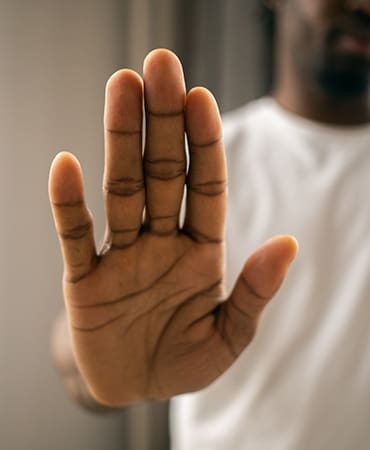
WHY ARE BOUNDARIES WITH YOUR ADDICT SO IMPORTANT?
Just as a frog will leap out of boiling water immediately, but remain in gradually heated water until it’s too late, I felt similarly trapped, as if slowly cooked. Throughout the years of my loved one’s addiction, my personal boundaries seemed to evaporate, or maybe I had never fully grasped the concept of boundaries before that? Growing up in an environment where boundaries weren’t respected, or where they were constantly violated, can make the establishment and maintenance of boundaries a daunting task. “Fawn” represents a trauma response, an often-overlooked one (in comparison to flight, fight, and freeze responses). “Fawn” serves as a coping mechanism, manifesting as avoiding conflict, people-pleasing, sacrificing your own comfort for others’, lacking personal boundaries, succumbing to co-dependency, agreeing with others to maintain harmony, and striving to create a sense of safety.

When we come from codependent dynamics, setting boundaries can feel confusing, terrifying, guilt ridden, and foreign, you just don’t know how to do it. Yet, having no boundaries with your addicted loved one sets the stage for disaster. To help yourself and your loved one ,you need to have boundaries, you need to understand practice and set very clear boundaries, for your safety, and ultimately for him/her as well.
It is said that “if your addict is happy with you, you are helping him/her kill themselves, if your addict is angry with you, you are helping to save his/her life”
“Daring to set boundaries is about having the courage to love ourselves even when we risk disappointing others” – Brene Brown

Boundaries are meant to protect us
Boundaries form a fundamental aspect of self-care— they are not only healthy and essential but also a normal part of life. They provide us with a sense of self, define our sphere, and ensure our safety.
Think of boundaries as personal perimeters; they need not be rigid barriers, but can also be like a consistent light encircling you, signaling: “I deserve respect.” They function to prevent individuals from encroaching into our personal space and exploiting us, while also preventing us from doing the same to others.
Ultimately, boundaries offer a means for each of us to express our individuality.
Establish boundaries for your own well-being, not to exert control over others.

How to set healthy boundaries
Clearly define your boundary and grasp the reasons behind its necessity. Consider what you wish to avoid seeing, hearing, or engaging in. Establish your limits—what you are willing to accept and what you will not tolerate. Convey your desires directly and unambiguously, using a composed and courteous demeanor.
Avoid feeling the need to apologize or elaborate; “NO” suffices as a complete response. It’s acceptable to be assertive. Commence with stricter boundaries and adjust as required. Address any breaches of boundaries promptly and determine a course of action for such instances. Anticipate initial resistance and stay resolute; remember, boundary-setting is an ongoing process.

Boundaries include action
After setting your boundary, it’s vital to plan an action in case it’s violated. Ensure the chosen action is something you can confidently follow through with, and that it’s proportionate to the boundary breach.
Examples of appropriate responses include: “If this behavior persists, I will need to limit my time spent with you.”
“If my requests aren’t respected, I’ll need some space before we can continue our conversation.”
“I won’t engage if you address me in such a disrespectful manner.”
“If you persist with pressuring or using guilt, I’ll have to end our discussion.”
“If you resort to drug use again, I won’t be able to have you stay.”
“While I’m fully supportive of your recovery, if you persist with substance abuse, I cannot have you around.”

Boundaries sound like:
“I understand you are angry, but you do not speak to me that way”
“I’m sorry, but I can’t help you this time”
“I don’t feel safe, so I am going to leave”
“I don’t give you permission to do…”
“I would appreciate you not bringing this up anymore”
“I am allowed to change my mind”
“I need time to think about this and I will get back to you later”
“If you text me, I’ll text back at a time that works best for me”

Signs that your boundaries are being violated
When someone communicates something that surpasses your comfort zone: Anger or Resentment: You experience anger, particularly if the cause is unclear, or you feel a sense of resentment. Physical Reaction: You may feel a sensation of warmth and flushing. Overwhelm or Drained Feeling: A sense of being overwhelmed, drained, or stifled might arise. Irritation: You might find yourself becoming irritated by certain sounds or movements. These reactions can signal that the topic or communication has crossed a boundary that you’re sensitive to. Recognizing these signs helps you become more attuned to your personal limits.
Trust your intuition
Setting boundaries is not selfish, it sets the tone for healthy relationships, it’s important for your wellbeing. Learn to trust yourself, to put your peace, comfort and sanity as your priority. If something feels wrong, it is wrong. If you are not sure, trust your intuition, your gut feelings will guide you. Always trust your gut. Your brain can be fooled, your heart is an idiot, but your gut doesn’t know how to lie.

GET IN TOUCH
PHONE
24/7 Contact: +27 79 465 4556
Yonit: +27 82 447 6727
EMAIL
admin@journeycentre.co.za
yonit@journeycentre.co.za
ADDRESS
16 Douglas Crowe Drive, Dolphin Coast,
Ballito